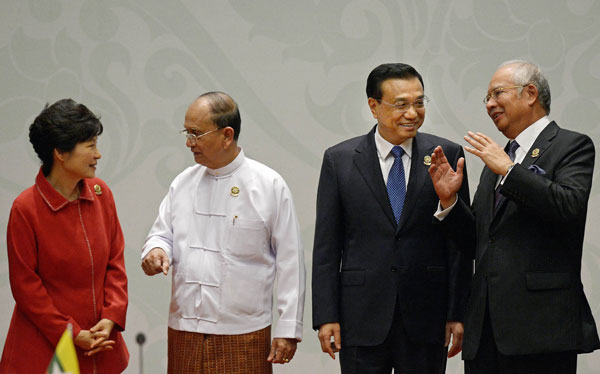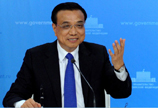Country pushes for code at South China Sea
 |
|
From left to right, South Korean President Park Geunhye speaks with Myanmar President Thein Sein, as Chinese Prime Minister Li Keqiang speaks with Malaysian Prime Minister Najib Razak ahead of a "family picture" during the 17th ASEAN Plus Three Summit at the Myanmar International Convention Center in Myanmar's capital of Nay Pyi Taw on Thursday. CHRISTOPHE ARCHAMBAULT /AGENCE FRANCEPRESSE |
Beijing pledges $20b in loans to boost Southeast Asian connectivity
China will push for the implementation of a code of conduct for the South China Sea - a document that will lessen the risk of escalating tensions in the area-but experts said such an agreement faces obstacles, at least in the short term.
Premier Li Keqiang reaffirmed China's resolve to safeguard territorial sovereignty at a series of three regional meetings in Nay Pyi Taw, Myanmar, on Thursday, saying the country is willing to adhere to the code, which has been under discussion for more than a decade.
Leaders from the Philippines and Vietnam, countries that have seen maritime tensions with China rise, also attended the meetings.
"China and Southeast Asian countries are close neighbors with common interests and diversified concerns. It is inevitable-not strange at all-that differences emerge among us, but those differences will not affect the general stability in the South China Sea," Li said at the East Asia summit. "I believe that as long as we treat each other with sincerity and seek common ground while acknowledging differences, there will be no insurmountable obstacles that will stand in our way," Li said.
Li said China's policy of building partnerships with its neighbors is sincere and consistent, and the situation in the South China Sea has been stable as freedom and safety of navigation is ensured.
Foreign Minister Wang Yi said last year that the code should reflect "consensus through negotiations" and "elimination of interference", indicating that maritime issues should be left to the parties directly involved to sort out through dialogue.
The declaration on the Conduct of Parties in the South China Sea was signed in 2002, in which all signatories agreed to work out a code of conduct to guide future activities in the region. But limited progress has been made in drafting the code since then.
In a bid to reach long-lasting peace in the region, Li pledged to speed up negotiations on a cooperation treaty.
China also agreed to establish a hotline for joint search and rescue efforts at sea as well as a hotline for senior officials.
Wu Shicun, president of the National Institute for South China Sea Studies, said the negotiation of the code has gone on for more than 10 years because of different opinions regarding how the document will be drafted and whether it will allow third-party intervention.
Lu Jianren, the chief researcher of Sino-ASEAN relations at Guangxi University, said the importance of the code lies in the fact that it rules out the use of military force as a means to resolve issues and that no party is allowed to take further action to escalate tension.
Economic ties
Also at Thursday's summit, China promised more loans and economic aid to Southeast Asia.
China will provide $10 billion in preferential loans to ASEAN countries and another development loan of $10 billion specifically for infrastructure.
China also started on projects for the second phase of the China-ASEAN Investment Cooperation Fund, which totals $3 billion.
Engineers have begun preliminary work on a rail network, which will start in Kunming, Yunnan province, and connect Laos, Vietnam, Cambodia, Myanmar, Thailand, Malaysia and Singapore.
Kavi Chongkittavorn, senior fellow at the Institute of Security and International Study in Thailand, said China and ASEAN were forging ever closer ties and despite differences there are areas of growing cooperation.
"Economic opportunities exist for each party," he said.
Wang Xu in Beijing contributed to this story.
Contact the writers at zhaoyinan@chinadaily.com.cn and zhaoyanrong@chinadaily.com.cn



